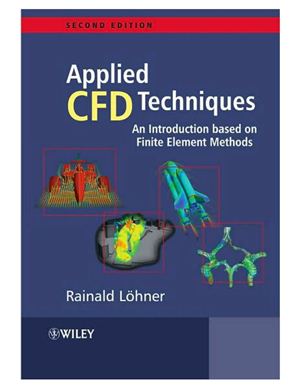Second Edition. Wiley, 2008. 544 p. ISBN:047051907X
Computational fluid dynamics (CFD) is conceed with the efficient numerical solution of the partial differential equations that describe fluid dynamics. CFD techniques are commonly used in the many areas of engineering where fluid behavior is an important factor. Traditional fields of application include aerospace and automotive design, and more recently, bioengineering and consumer and medical electronics. With Applied Computational Fluid Dynamics Techniques, 2nd edition, Rainald L?hner introduces the reader to the techniques required to achieve efficient CFD solvers, forming a bridge between basic theoretical and algorithmic aspects of the finite element method and its use in an industrial context where methods have to be both as simple but also as robust as possible.
This heavily revised second edition takes a practice-oriented approach with a strong emphasis on efficiency, and offers important new and updated material on;
Overlapping and embedded grid methods
Treatment of free surfaces
Grid generation
Optimal use of supercomputing hardware
Optimal shape and process design
Applied Computational Fluid Dynamics Techniques, 2nd edition is a vital resource for engineers, researchers and designers working on CFD, aero and hydrodynamics simulations and bioengineering. Its unique practical approach will also appeal to graduate students of fluid mechanics and aero and hydrodynamics as well as biofluidics.
Computational fluid dynamics (CFD) is conceed with the efficient numerical solution of the partial differential equations that describe fluid dynamics. CFD techniques are commonly used in the many areas of engineering where fluid behavior is an important factor. Traditional fields of application include aerospace and automotive design, and more recently, bioengineering and consumer and medical electronics. With Applied Computational Fluid Dynamics Techniques, 2nd edition, Rainald L?hner introduces the reader to the techniques required to achieve efficient CFD solvers, forming a bridge between basic theoretical and algorithmic aspects of the finite element method and its use in an industrial context where methods have to be both as simple but also as robust as possible.
This heavily revised second edition takes a practice-oriented approach with a strong emphasis on efficiency, and offers important new and updated material on;
Overlapping and embedded grid methods
Treatment of free surfaces
Grid generation
Optimal use of supercomputing hardware
Optimal shape and process design
Applied Computational Fluid Dynamics Techniques, 2nd edition is a vital resource for engineers, researchers and designers working on CFD, aero and hydrodynamics simulations and bioengineering. Its unique practical approach will also appeal to graduate students of fluid mechanics and aero and hydrodynamics as well as biofluidics.

